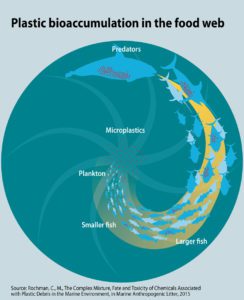Why is plastic bad for the environment?
Why is plastic bad for the environment? Plastic was once seen as a miracle material, and now it’s our planet’s worst nightmare. Plastic affects all life on Earth, whether we realize it or not. Even though plastic has only been mass-produced since the 1950’s, its effect is huge. Producing plastic creates fossil fuel emissions and pollution. 99% of plastic products are made from fossil fuel-based chemicals. These chemicals contribute directly to climate change. The United States recycles less than 10% of the plastic and the world recycles only 18% of plastic. A lack of working recycling plants means poor recycling.
Reasons why plastic is bad for the environment
Plastic pollution affects both surf and turf. Plastic waste invades our water and our soil, and damages farming and drinking water supply. According to National Geographic, 9 million tons of plastic find their way into the oceans. To be specific, 86% of all sea turtles, 43% of all marine mammals, and 44% of all seabirds have ingested microplastics.
How to avoid microplastics
When plastic breaks down to particles less than 5 mm, it produces microplastics. They break down into even smaller particles, and easily enter our soil and water. When animals ingest microplastics, it creates a domino effect up the food chain, from the smallest sea creature to us when we eat seafood. This is called bio-accumulation. Here’s what you can do immediately: buy less plastic or better yet, stop buying it altogether. Also, always be sure to recycle the plastic that ends up in your hands.
Why is plastic packaging bad for the environment
In one year, over 1 million sea birds died from plastic and 100,000 marine creatures died when they were entangled in plastic. Plastic ingestion leads to digestive issues, and eventually starvation. Animals can’t tell the difference between a belly full of food and one full of plastic. In addition to our marine mammals, plastic also puts grazing animals (raccoons, squirrels, dogs, cats, etc.) at risk for digestive issues, starvation, and fatal entrapment. Plastic packaging makes its way into natural habitats, creating toxic situations for the creatures within them. Look at the bottom line: every living being on this planet is at risk because of plastic. Check out the many resources available to help you ditch plastic and help others to do the same. Visit http://www.plasticfreejuly.org/ for tips and tricks on how to #choosetorefuse!
Sources:
http://www.bpf.co.uk/plastipedia/plastics_history/Default.aspx
https://environmentflorida.org/feature/fle/wildlife-over-waste
http://www.plasticpollutioncoalition.org/pft/2015/11/17/plastic-pollution-and-climate-change
https://www.the-scientist.com/features/plastic-pollutants-pervade-water-and-land-31445
https://www.crd.bc.ca/education/our-environment/concerns/habitat-loss-degradation
Header Image: https://www.pinterest.com/pin/537687642996304019/?lp=true








